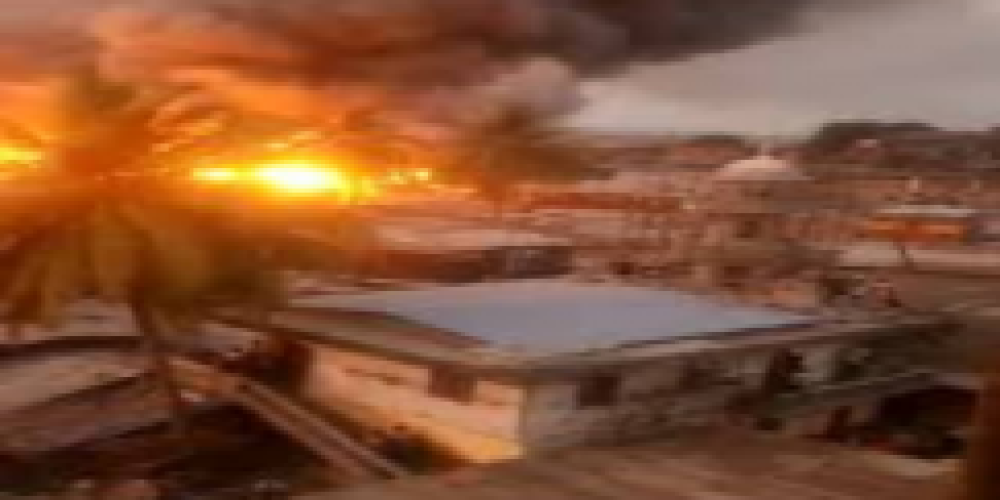By Kadiatu A Turay
A relentless wave of fire disasters is sweeping Sierra Leone, reducing homes to ashes, shattering livelihoods, and exposing deep cracks in the nation’s disaster preparedness, from Freetown’s crowded slums to Bo’s bustling markets, over 2,000 blazes in 2024 alone 60% preventable, per the National Fire Force (NFF) have turned a once-seasonal threat into a year-round crisis. As Sierra Leone grapples with this inferno epidemic, urgent action is needed to address systemic failures in urban planning, fire response, and public awareness.
The toll is heartbreaking. In Susan’s Bay, a recent fire left hundreds homeless, including Mariatu Kamara, a 38-year-old mother of four, I left to buy food and came back to nothing not even a shoe was spared, she wept, similar scenes unfold nationwide, with delayed or absent emergency services amplifying the pain. In rural Port Loko, 2024 market fire erased decades of savings for traders like Abu Sesay, who said, we watched our lives burn, waiting for help that never came.
The NFF points to multiple culprits faulty wiring and illegal connections in slums, unattended stoves and candles, arson.
Tied to disputes, and dry-season open burning fanned by winds. Ignorance and carelessness spark most fires, said Superintendent Joseph Kanu, in Kroo Bay, people light flames near thatch roofs what do they expect overcrowded settlements, built without planning, turn sparks into infernos, with no access for fire trucks or hydrants.
Sierra Leone’s fire response is woefully under-resourced. With just a handful of working fire trucks for 7 million people, stations often resort to buckets in slums, we’re asked to be heroes with no fuel, no gear, no water, said firefighter Daniel Sesay, outside Freetown, many towns lack stations entirely, forcing reliance on distant units slowed by bad roads, a 2024 NFF report flagged chronic underfunding, with budgets barely covering repairs, let alone expansion.
Unplanned settlements like Cockle Bay and Kolleh town are tinderboxes, packed with flammable shacks and no emergency routes, urban planner Ibrahim Jalloh minced no words these aren’t poorly planned they’re unplanned, without building codes or infrastructure, fires will keep winning, Freetown’s growth, with 40% of residents in informal housing per 2023 UN data, outpaces regulation, leaving communities vulnerable.
Fires disproportionately harm women and children, often trapped indoors during outbreak, Girls lose schoolbooks, boys end up in tents it’s stolen futures, said Fatmata Conteh, a Lungi NGO worker, Trauma lingers, with families like Mariatu’s forced to start over. In 2024, over 1,000 children dropped out post-fires, per Ministry of Education estimates, unable to afford fees after losses.
Some traditional leaders shine chief Bai Koroma in Bombali banned late-night burning and fined negligence but others remain passive, chiefs must lead, not wait, Koroma urged. Local councils, tasked with safety, often lack funds or will to act, leaving gaps in prevention like community fire drills.
Ignorance drives many incidents, with residents unaware of basic safety like dousing coals or checking wires, the national disaster management agency (NDMA) runs radio campaigns, but reach is limited, Jingles aren’t enough; we need to hit markets, mosques, schools, said NDMA’s Aminata Bangura. Volunteers like Agnes Bangura of the Sierra Leone Red Cross teach prevention door-to-door, but scale remains small.
Media coverage often focuses on destruction, not solutions, missing chances to educate, yet groups like Caritas and Youth in Action deliver relief and training, we show kids how to spot fire risks it saves lives, Agnes Bangura said. Scaling these efforts could shift the tide, but funding lags.
The Ministry of Internal Affairs and NDMA have launched fire safety drives, but critics like policy analyst Emmanuel Gbamanja call them fragmented, we need a National fire management Strategy planning, education, equipment, all in one, he said. Budgets for fire services under 1% of national spending in 2024 can’t meet demand. Partnerships with UNDP and ECOWAS exist, but fire-specific aid is scarce. Ghana’s Fire Safety Clubs offer a model Sierra Leone could adapt.





